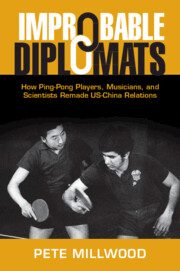Book contents
- Improbable Diplomats
- Cambridge Studies in US Foreign Relations
- Improbable Diplomats
- Copyright page
- Contents
- Figures
- Acknowledgments
- Abbreviations
- Introduction
- Prologue
- 1 By Popular Demand
- 2 Ping-Pong Diplomacy’s Return Leg and After
- 3 New Liaisons
- 4 Familiarity Breeds Contempt
- 5 Asking for More in Exchange
- 6 Political Science
- Epilogue
- Conclusion
- Bibliography
- Index
6 - Political Science
Published online by Cambridge University Press: 15 December 2022
- Improbable Diplomats
- Cambridge Studies in US Foreign Relations
- Improbable Diplomats
- Copyright page
- Contents
- Figures
- Acknowledgments
- Abbreviations
- Introduction
- Prologue
- 1 By Popular Demand
- 2 Ping-Pong Diplomacy’s Return Leg and After
- 3 New Liaisons
- 4 Familiarity Breeds Contempt
- 5 Asking for More in Exchange
- 6 Political Science
- Epilogue
- Conclusion
- Bibliography
- Index
Summary
This chapter analyzes how diplomacy over Sino-American scientific cooperation was central to the final agreement for China and the United States to establish official diplomatic relations, finally reached in December 1978. In the wake of Mao Zedong’s death in September 1976, China’s emerging post-Mao leadership prioritized the People’s Republic of China (PRC)’s scientific development, believing that drawing on scientific knowledge from outside of China – including from the United States – was critical to the country’s development. The Committee on Scholarly Communication with the PRC had long been arguing that China’s interest in US science provided leverage to the United States and, after President Jimmy Carter recruited the top leadership of the CSCPRC into his administration, utilizing this leverage became a critical part of US China policy. Thus, Chinese and US leaders, working hand-in-glove with the nongovernmental CSCPRC, achieved a simultaneous upgrading of the Sino-American scientific and diplomatic relationship in 1978 that offered a final demonstration of the symbiotic relationship between exchange and high-level Sino-American diplomacy in the pre-normalization era.
Keywords
- Type
- Chapter
- Information
- Improbable DiplomatsHow Ping-Pong Players, Musicians, and Scientists Remade US-China Relations, pp. 267 - 311Publisher: Cambridge University PressPrint publication year: 2022



